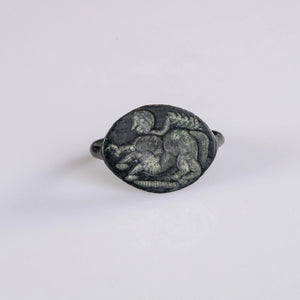Interesting facts
The Last Monarch: Lucius Tarquinius Superbus
The depths of ancient history reveal figures who capture our imagination. None more so than Lucius Tarquinius Superbus, the last king of Rome, whose fall paved the way for the Roman Republic. His reign isn't just about political change; it sheds light on governance, power struggles, and Rome's desire for a fair system. Learn more about the Roman Republic.
Tarquinius Superbus ruled from 535 BC until 509 BC. His name, meaning "the Proud," highlights his notorious and oppressive reign, condemned by both the aristocracy and commoners. However, to truly understand his place in history, we must first consider Rome itself.
An Emerging Rome
Rome's early days were a mosaic of villages on Palatine Hill, governed by semi-elective monarchs. These kings wielded military and religious power, shaping Rome's social and political fabric. Yet, under Tarquinius, this system crumbled.
Tarquinius's unchecked rule abused tradition and the Senate's counsel, sparking resentment. He became known as a tyrant, using fear to assert control, yet it was his son Sextus whose heinous deed ignited a revolution. Read about the Roman Republic on Britannica.
The Catalyst for Change
The vile act committed by Sextus Tarquinius against Lucretia, a noblewoman, catalyzed Rome's shift from monarchy to a republic. Her tragic story rallied support across Rome to overthrow Superbus. Lucius Junius Brutus, standing for republican ideals, led this charge, representing the values of justice and honor cherished by the Roman people. Explore more about the values cherished by Romans.
The Birth of the Roman Republic
The ousting of Tarquinius in 509 BC marked a watershed in history. Rome embraced republicanism, emphasizing elected magistrates and a Senate, steering away from the whims of a sole ruler. This pivot was foundational, impacting Roman governance and influencing political thought henceforth.
Legacy and Lessons
Tarquinius Superbus' legacy is a discourse on tyranny. It warns of the dangers of autocracy and enriches our understanding of balance between power and accountability. The fall of the last king imparts enduring lessons on governance—a narrative still relevant today, prompting us to envision better political systems.
The narrative of rebellion and the rise of the Republic echo throughout history, from the Magna Carta to modern democratic systems. These moments symbolize humanity's quest to limit power and ensure justice.
Reflection on Power
Imagine Rome at its historic turn from a kingdom. These events shaped by human courage and choice are timeless. They remind us that history is a compilation of human narratives, striving for fair governance.
Surprisingly, the lasting echo of Tarquinius Superbus also surfaces in art, like the 'Auriga' - Roman Silver Ring available at auroraantiqua.store. This artifact ties history to the present, a piece you can wear to remember and celebrate Rome's bold journey to republicanism—an ideal embodied by artisans who value legacy and craftsmanship.
For those curious about history, holding this piece isn't just wearing jewelry but carrying a fragment of Roman legacy.
Why should we still care about the fall of Tarquinius Superbus?
The fall of Tarquinius Superbus is more than a tale of ancient politics; it's a lasting lesson on the dangers of unchecked power and the enduring quest for justice and freedom. It reminds us of the impact of governance on society and inspires contemporary democratic thought, urging us to reflect on our systems of power and the importance of civic engagement.
When you share this story, think about the personal stakes of such a shift. It's not just historical; it's a personal narrative about heritage, identity, and civic values. Discover more on personal narratives in history.
Conclusion
Reflecting upon Lucius Tarquinius Superbus—the last king of Rome—we see an era marked by tyranny that led to a revolution, underscoring the eternal human quest for freedom and justice. This historic tale urges awareness of how power dynamics shape societies, calling for vigilance and engagement in our roles as citizens.
Who was Lucius Tarquinius Superbus?
Lucius Tarquinius Superbus was the seventh and last king of Rome, ruling from 535 BC to 509 BC known for his tyrannical style that led to the monarchy's downfall.
How did Tarquinius Superbus's reign end?
His reign ended in 509 BC following a public uprising spurred by his son Sextus’s crime against Lucretia, leading to the establishment of the Roman Republic.
What was the significance of the Roman Republic's formation?
The formation marked a move away from monarchical rule, introducing a system of shared governance that influenced political structures for centuries.




